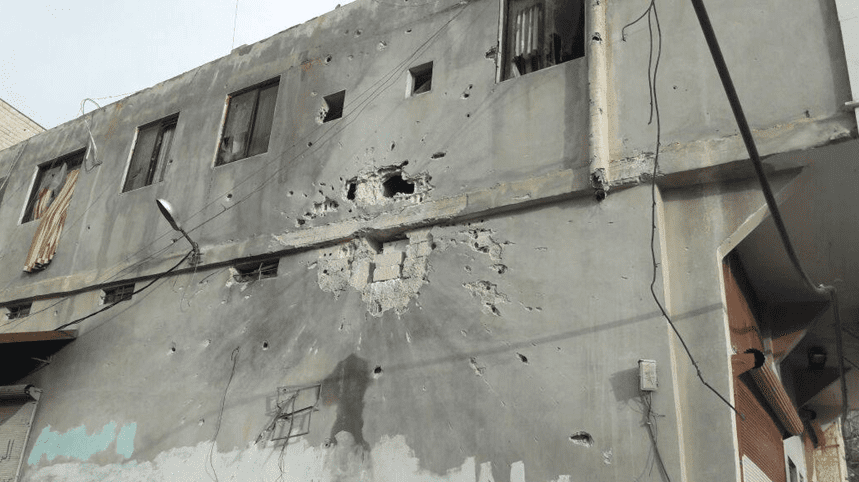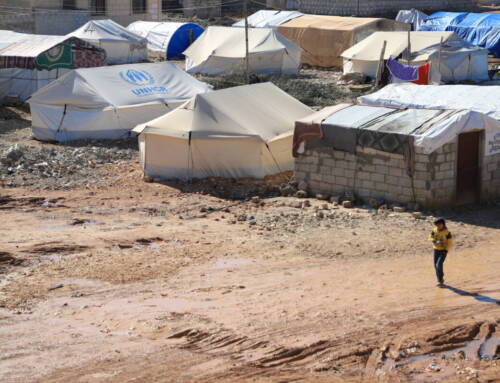Hungry Madaya residents afraid to pick up food aid as snipers target distribution centers
Regime and Hezbollah fighters surrounding the Outer Damascus town of […]
20 March 2017
Regime and Hezbollah fighters surrounding the Outer Damascus town of Madaya are gunning down residents who approach food distribution points, a local council representative tells Syria Direct.
“Hezbollah and regime snipers shoot at anyone who tries to reach the distribution centers,” Madaya Local Council spokesman Firas al-Hussein tells Syria Direct’s Mohammed al-Falouji. “Residents are targeted by artillery fire, too.”
As a result, the local council stopped distributing food parcels to nearly half of the 40,000 residents in the besieged town, which received its first UN-sponsored aid delivery in five months on March 14.
Of the six residents who were shot since the aid delivery, two are dead, and one is comatose, says al-Hussein.
The snipers, who ring the town along with thousands of landmines, shoot “at anyone who attempts to flee from the blockade,” Syria Direct has reported.
Since fighters surrounded the former resort town in July 2015, more than 20 Madaya residents have been killed by snipers and landmines, according to a July 2016 report by Physicians for Human Rights.
Hezbollah media outlet Al-Manar did not report the shootings, but did report on March 15 that rebels shelled an aid distribution point in the pro-regime town of Fuaa they have encircled in northwest Idlib province.

The International Committee of the Red Cross (ICRC), which helped deliver the aid, has not commented on the shootings.
If the sniping continues, says al-Hussein, local council members will begin distributing the remaining food packages in the middle of the night.
“It’s a risky plan, and [residents] may lose their lives since snipers are posted in the surrounding hills.”
Q: How many residents in total have been shot by snipers this past week?
So far six residents. Two have died and one is lying in the hospital, comatose. One man, from neighboring Baqin, was shot when the UN convoy entered. The next day, while the aid trucks were finishing unloading the supplies, several young men were shot.
Q: Local media reported that residents are being targeted by sniper and artillery fire. How has this affected the local council’s ability to distribute aid packages to residents?
We have not distributed any food packages to the northern section of the town, because Hezbollah and regime snipers shoot at anyone who tries to reach the distribution centers. Residents are targeted by artillery fire, too.
The local council did distribute aid to the southern part of the city, however, since it doesn’t lie in view of the snipers.
Q: Where did the local council store the supplies once the aid convoy left? Were any of the aid warehouses targeted or damaged?
The packages were stored in highly secure warehouses, since we’re afraid someone may steal them. Two warehouses are located in the north part of town and two in the south. There is also a warehouse for displaced families from Zabadani.
Q: How will you distribute aid if the sniping continues?
Local council employees are planning to deliver the food packages in the middle of the night. It’s a risky plan, and they may lose their lives since snipers are posted in the surrounding hills.
But this is the only way to distribute aid to residents, who have run out of most of their food.
The 18,000 residents who have still not received food packages will suffer because of the delay in distribution. About 95 percent of them don’ t have bread, sugar, salt, ghee or legumes. Some might risk their lives in order to feed their children. If a child is crying from hunger, and food is only a handful of meters away, of course his father will try to go to the warehouse. He’ll risk getting shot by a sniper just to get a case of flour to feed his children.
Also, the aid that entered will only last for a month, two at most. Residents will suffer even more once the food runs out, and they’ll wait eagerly until another aid delivery occurs.







